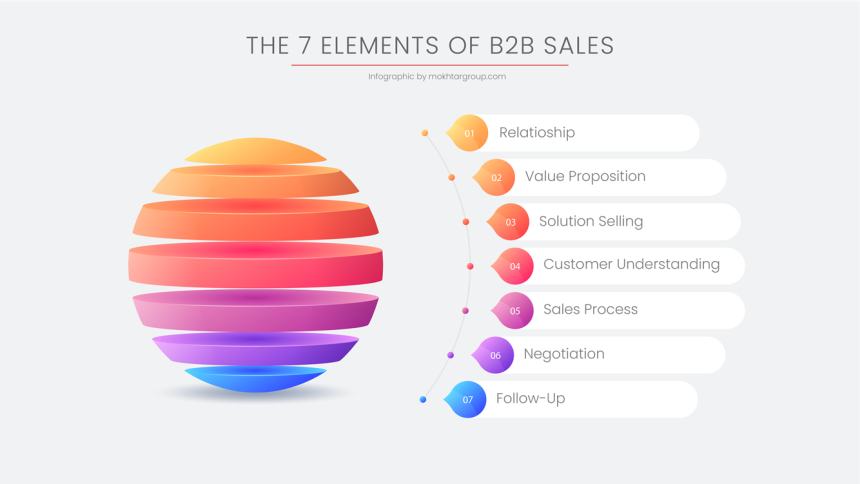Just as art is constructed from basic elements like line and color, the complex process of B2B sales is built upon fundamental components. These elements serve as the building blocks for creating effective sales strategies. Imagine them as the atoms in the world of sales, combining in various ways to form the molecules of successful business relationships. Whether they’re forming simple connections or complex strategic partnerships, these elements are crucial for sales professionals.
Like artists who mix different elements to create a masterpiece, sales professionals combine these components in various proportions according to the context and customer.
Karim Mokhtar

The 7 Elements of B2B Sales
Professional B2B Salespeople utilize these foundational elements:
1. Relationship — The Foundation of B2B Sales
Relationships are the bedrock upon which successful transactions are built. Unlike transactional sales, B2B sales involve significant investments of time, money, and trust. Establishing a strong rapport with clients involves consistent communication, active listening, and a genuine interest in their success. Trust is cultivated over time through reliability and the delivery of promised outcomes. For example, engaging in regular check-ins, attending client events, or even showing interest in their industry updates can solidify the partnership. This foundation fosters loyalty and turns clients into advocates who refer your business to others.
2. Value Proposition — Communicating Unique Benefits
A compelling value proposition is at the heart of every successful B2B pitch. It answers the client’s fundamental question: “Why should I choose you?” This involves clearly articulating how your products or services uniquely solve their problems, improve their operations, or provide competitive advantages. A strong value proposition is not just about listing features but tying them directly to the client’s goals. For example, instead of saying, “Our software automates processes,” say, “Our software reduces your operational costs by 25% while improving accuracy.” A well-crafted value proposition demonstrates your understanding of the client’s priorities and positions your company as the ideal partner.
3. Solution Selling — Addressing Specific Challenges
Solution selling shifts the focus from the product to the client’s needs. This approach requires sales professionals to act as consultants who diagnose challenges and propose tailored solutions. For instance, rather than promoting generic software, a solution-selling approach might involve demonstrating how a specific feature addresses a unique issue the client is facing, such as improving team collaboration or enhancing customer retention. By aligning your offerings with their specific pain points, you not only increase the likelihood of closing the sale but also position yourself as a problem-solver, building long-term trust and credibility.
4. Customer Understanding — Knowing the Client Inside Out
Understanding your client’s business is not just a prerequisite—it’s a differentiator in B2B sales. This requires thorough research into their industry, competitors, and specific challenges. Empathy plays a critical role here; it’s about seeing their world through their eyes and aligning your efforts with their objectives. Sales representatives who invest in understanding their clients can anticipate needs before they arise, provide tailored solutions, and position themselves as strategic partners. Tools like CRM systems, industry reports, and even client interviews can provide insights to ensure you truly understand their pain points and goals.
5. Sales Process — Structuring the Process
A well-defined sales process is essential for navigating the complexities of B2B sales. This structured approach ensures consistency, efficiency, and scalability across the sales team. From lead generation to closing the deal, each step of the process should be clearly defined and supported by tools such as CRM platforms and automation software. For example, a typical process might include prospecting, initial contact, needs assessment, proposal, negotiation, and follow-up. Having a structured approach not only improves your chances of success but also helps identify weak points in the pipeline, enabling continuous improvement in sales strategies.
6. Negotiation — Finding Win-win Agreements
Negotiation is a critical skill in B2B sales, requiring a balance of firmness and flexibility. The goal is to reach agreements that satisfy both parties while protecting your company’s interests. Effective negotiators prepare thoroughly, understanding their client’s priorities, potential objections, and acceptable compromises. Active listening during discussions allows for creative solutions that address concerns without sacrificing value. For example, if a client is hesitant about pricing, offering flexible payment terms or added services can demonstrate goodwill while maintaining profitability. Strong negotiation skills not only close deals but also leave clients feeling valued, setting the stage for future collaborations.
7. Follow-Up — Building Long-term Partnerships
The sale doesn’t end when the contract is signed—it’s where the relationship truly begins. Follow-up is crucial for ensuring client satisfaction, addressing any post-sale issues, and identifying opportunities for upselling or cross-selling. Consistent communication demonstrates your commitment to the client’s success and builds a foundation for a long-term partnership. This might involve regular performance reviews, providing additional training, or simply checking in to see how things are going. Effective follow-up turns one-time customers into loyal clients and brand advocates, driving repeat business and referrals in the competitive B2B landscape.
Why Are They Important?
Understanding the elements of B2B sales is vital for several reasons. Primarily, without a grasp of these fundamental parts, effectively executing a sales strategy would be challenging. These elements are the tools that enable sales professionals to craft solutions, communicate value, and build relationships essential for success.
Moreover, being familiar with these elements allows sales teams to:
– Describe and refine their sales approach
– Analyze the dynamics of specific sales interactions
– Communicate strategies and results effectively within their team or organization
Just as musicians or botanists use specialized language for clarity and efficiency, sales professionals leverage these elements to streamline communication and enhance understanding within their field.
Knowing these elements also empowers salespeople to approach clients confidently, tailor their sales pitches more effectively, and navigate the complexities of B2B transactions with greater ease. Whether preparing a proposal, discussing a potential solution, or simply networking, the ability to refer to and utilize these fundamental components of sales ensures that professionals can always navigate the B2B landscape with authority and precision.
Just like the elements of art, the elements of B2B sales are both indispensable and immensely practical. Remembering relationship, value proposition, solution selling, customer understanding, sales process, negotiation, and follow-up will not only enhance your ability to sell effectively but also enrich your understanding and execution of the B2B sales process.





